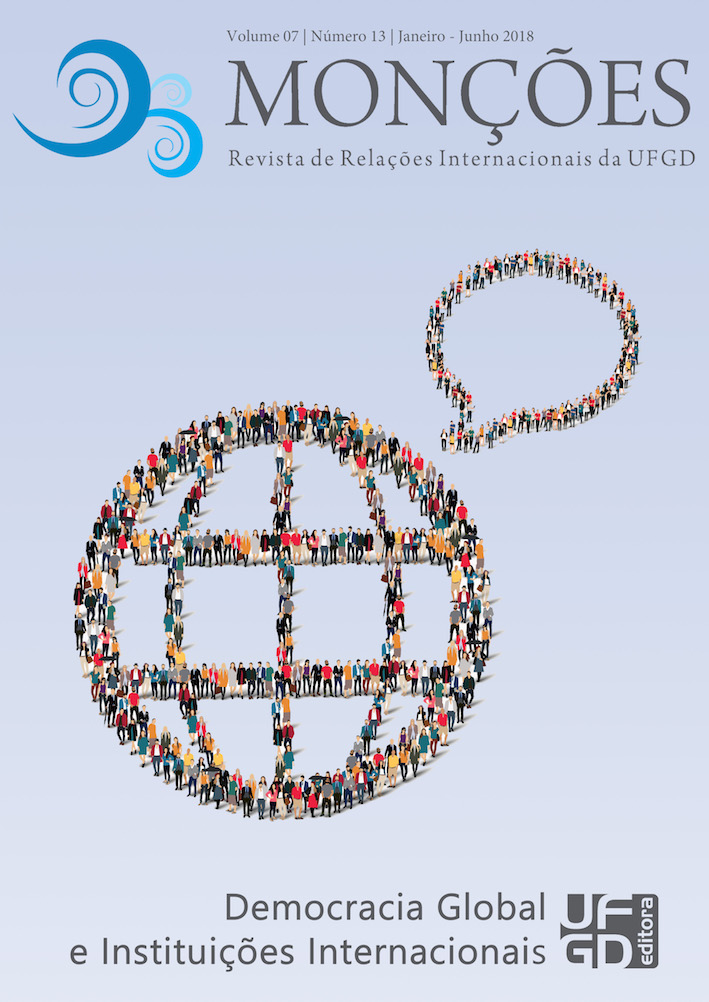International actors and cyber power: the role of technology transnational actors in the digital age
DOI:
https://doi.org/10.30612/rmufgd.v7i13.8723Keywords:
cyberspace, institutions, powerAbstract
This article analyses the power relations in a world where new digital technologies change the capacity of international actors, having direct consequences on the national states and the international institutions. The international relations are approached from a discussion about the cyberspace expansion, hoping to understand how the societies react towards the changes on the social interaction pattern and how the resources of cybernetic power are utilized by transnational corporations of information and communication technologies. It is outstanding the increasing role of algorithms on social life and also as an instrument of power, in order to reflect on the transformations of international socialization processes and the increasing difficulty to establish consensus and converge expectations from different actors around collective goals. In conclusion, the biggest plurality of actors with influence capacity at the international system and the dispute for having access, to concentrate and to maintain resources of cybernetic power, are presented as one of the main reasons for the changes that have been occurring at the current scenario.
Downloads
References
ÁVILA Rafael. Oliveira de.; PINHEIRO Marta Kerr. Poder Informacional nas Relações Internacionais Contemporâneas. Monções: Revista de Relações Internacionais da UFGD, Dourados, v.3. n.5, jan./jun., 2014.
BALDWIN, David. Power and International Relations: A Conceptual Approach. Princeton/Oxford: Princeton University Press, 2016.
BARNETT Michael; DUVALL, Raymont. Power in Global Governance. New York: Cambridge University Press, 2005.
BERENSKOETTER Felix.; WILLIAMS, Michael. Power in World Politics. New York: Routledge, 2007.
BENEDIKT, Michael. Cyberspace: Some Proposals, IN: BENEDIKT, Michael (org.) Cyberspace: First Steps. Cambridge MA: The MIT Press. 1994.
BENKLER, Yochai. Open-source economics. TED Talks, 2008. Disponível em: <https://goo.gl/cRTXCT>. Acesso em 30 nov 2017.
BENKLER, Yochai. The Wealth of Networks: How Social Production Transforms Markets and Freedom. Yale University Press, New Haven and London, 2006.
CANABARRO, Diego Rafael. Governança global da Internet: tecnologia, poder e desenvolvimento. Tese de Doutorado em Ciência Política, Universidade Federal do Rio Grande do Sul, 2014.
CASTELLS, Manuel. A Network Theory of Power. International Journal of Communication, 2011. Disponível em: <https://faculty.georgetown.edu/irvinem/theory/Castells-Network-Power-2011.pdf>. Acesso em 5 mar 2018.
CAVELTY, Myriam. Europe's cyber-power. European Politics and Society, 2018. Disponível em: <https://www.tandfonline.com/doi/abs/10.1080/23745118.2018.1430718>. Acesso em 5 mar 2018.
CHOUCRI, Nazli. Cyberpolitics in International Relations. MIT Press, 2012.
CHOUCRI, Nazli. Co-Evolution of Cyberspace and International Relations: New Challenges for the Social Sciences. Massachusetts Institute of Technology Political Science Department, Research Paper No. 2014-29. 2014. Disponível em: <https://papers.ssrn.com/sol3/papers.cfm?abstract_id=2514532>. Acesso em 26 fev 2018.
DODGE, Martin.; KITCHIN, Rob. Mapping Cyberspace. Taylor & Francis e-Library. 2001.
DOURISH Paul. Algorithms and their others: Algorithmic culture in context. Big Data & Society, 2016. Disponível em: <http://journals.sagepub.com/doi/pdf/10.1177/2053951716665128>. Acesso em 28 fev 2018.
FINNEMORE, Martha; GOLDSTEIN, Judith. Back to Basics: State Power in a Contemporary World. New York: Oxford University Press, 2013.
GUZZINI, Stefano. Power, realism and constructivism. New York/London: Routledge, 2013.
INTRONA, Lucas. Algorithms, Governance and Governmentality: On governing academic writing. Science, Technology, & Human Values, Vol 41, Issue 1, pp. 17 - 49. 2015. Disponível em: <http://journals.sagepub.com/doi/abs/10.1177/0162243915587360#articleCitationDownloadContainer>. Acesso em 28 fev 2018.
KRASNER, Stephen. Causas Estruturais e Consequências dos Regimes Internacionais: regimes como variáveis intervenientes. Revista de Sociologia e Política, Curitiba, v. 20, n. 42, p. 93-110, jun. 2012. p. 94.
KUEHL, Daniel. From Cyberspace to Cyberpower: Defining the Problem. In: KRAMER Franklin; STARR, Stuart; WENTZ, Larry (Org.). Cyberpower and National Security. Potomac Books, University of Nebraska Press. 2009. Disponível em: <http://www.jstor.org/stable/j.ctt1djmhj1.7>. Acesso em 7 mar 2018.
KURBALIJA, Jovan. An Introduction to Internet Governance. DiploFoundation, 2014. 6a ed.
LEMOS, Ronaldo. Democracia está sob a mira de ciberataques. Folha de São Paulo, 8 maio 2017.
LOPES, Gills. Relações Internacionais Cibernéticas (CiberRI): Uma Defesa Acadêmica a Partir dos Estudos de Segurança Internacional. Tese de Doutorado em Ciência Política, Universidade Federal de Pernambuco, 2016.
NYE, Joseph. The future of power. New York: PublicAffairs, 2011 (versão não paginada, obra em formato .mobi ).
NYE, Joseph. How Sharp Power Threatens Soft Power. Foreign Affairs, 24 jan 2018. Disponível em:<https://www.foreignaffairs.com/articles/china/2018-01-24/how-sharp-power-threatens-soft-power>. Acesso em 27 fev 2018.
NYE, Joseph. Power in the Global Information Age: From Realism to Globalization. Taylor & Francis e-Library, 2004.
PORTELA, Lucas. Agenda de Pesquisa sobre o Espaço Cibernético nas Relações Internacionais. Revista Brasileira de Estudos de Defesa. v. 3, nº 1, jan./jun. 2016, p. 91-113. Disponível em: <https://rbed.abedef.org/rbed/article/viewFile/62071/37922>. Acesso em 26 fev 2018.
SEAVER, Nick. Algorithms as culture: Some tactics for the ethnography of algorithmic systems. Big Data and Society, 2017. Disponível em: <http://journals.sagepub.com/doi/pdf/10.1177/2053951717738104>. Acesso em 28 fev 2018.
STRIPHAS Ted. What is an Algorithm? Culture Digitally. 2012. Disponível em: . Acesso em 28 fev 2018.
VENTRE, Daniel. Ciberguerra. In: XIX Curso Internacional de Defensa Jaca - Seguridad global y potencias emergentes en un mundo multipolar. 2011. Disponível em: <https://publicaciones.defensa.gob.es/media/downloadable/files/links/P/D/PDF48.pdf>. Acesso em 26 fev 2018.
Downloads
Published
How to Cite
Issue
Section
License
- Os autores e autoras mantêm os direitos autorais e concedem à revista o direito de primeira publicação, com o trabalho simultaneamente licenciado sob a Creative Commons Atribuição-NãoComercial-CompartilhaIgual 3.0 Brasil. que permite o compartilhamento do trabalho com reconhecimento da autoria e publicação inicial nesta revista.
- Autores e autoras têm autorização para assumir contratos adicionais separadamente, para distribuição não-exclusiva da versão do trabalho publicada nesta revista (ex.: publicar em repositório institucional ou como capítulo de livro), com reconhecimento de autoria e publicação inicial nesta revista.
- Autores e autoras têm permissão e são estimulados a publicar e distribuir seu trabalho online (ex.: em repositórios institucionais ou na sua página pessoal) a qualquer ponto antes ou durante o processo editorial, já que isso pode gerar alterações produtivas, bem como aumentar o impacto e a citação do trabalho publicado, porém invariavelmente com o reconhecimento de autoria e publicação inicial nesta revista.

